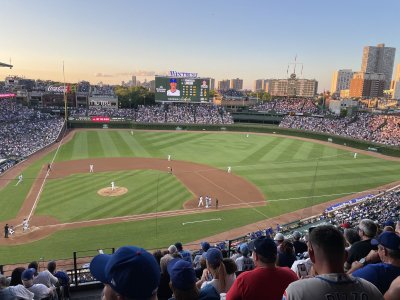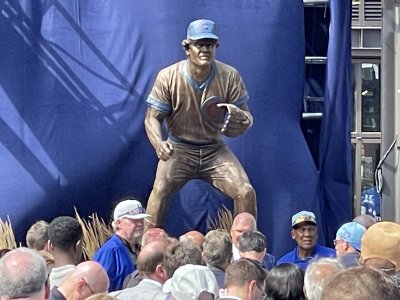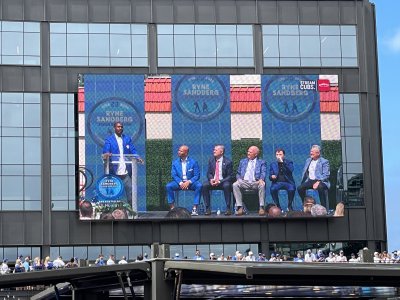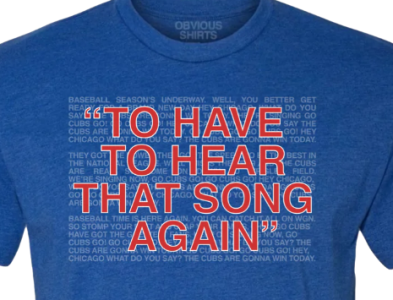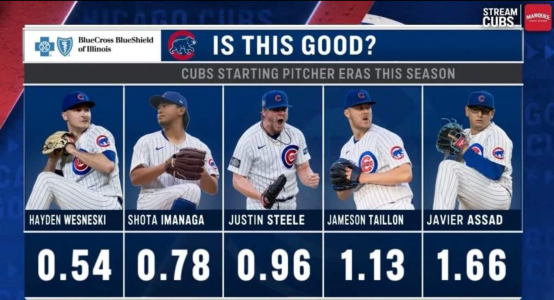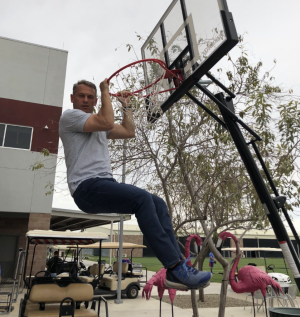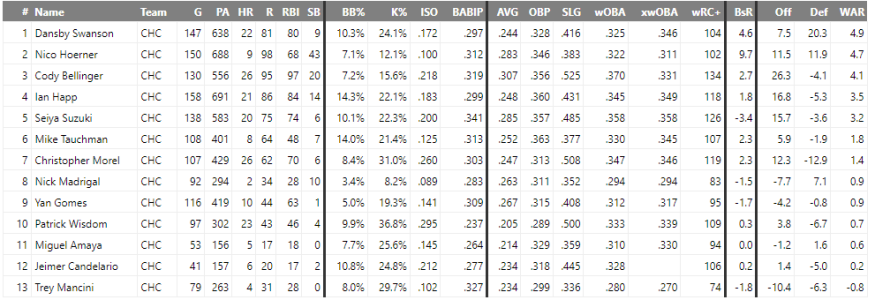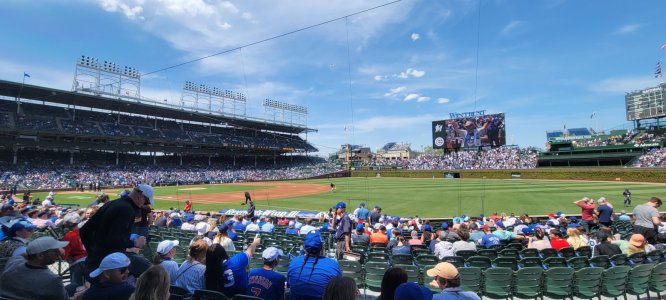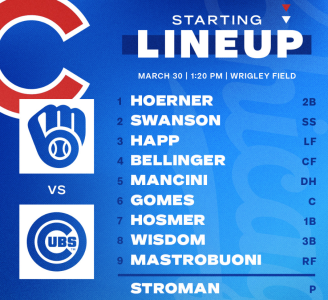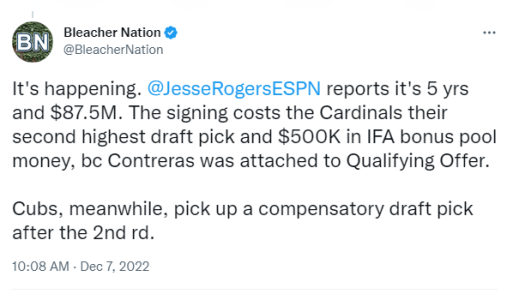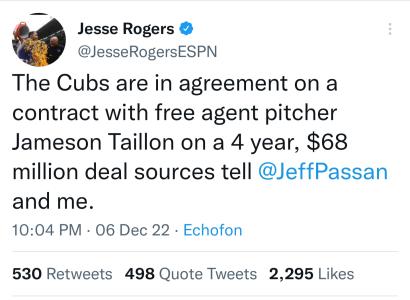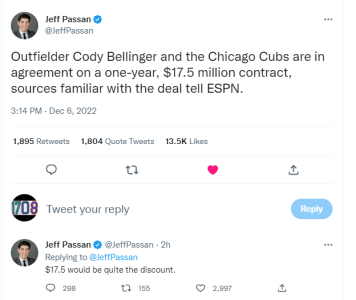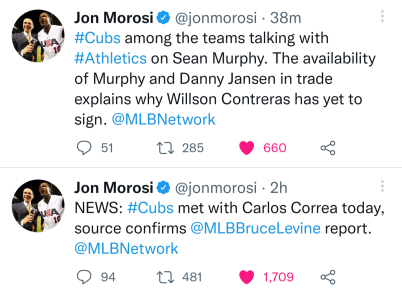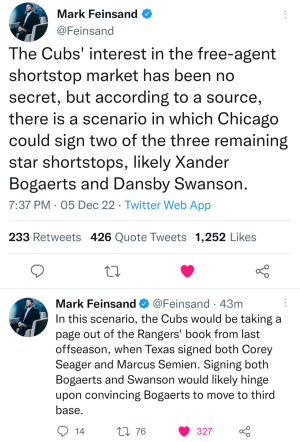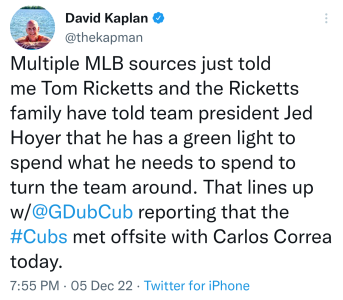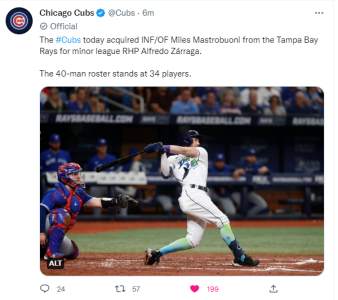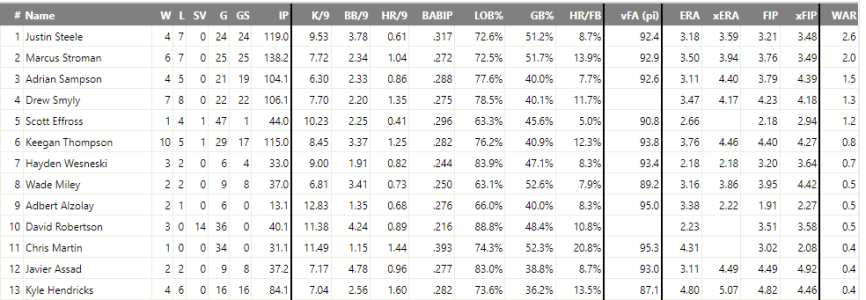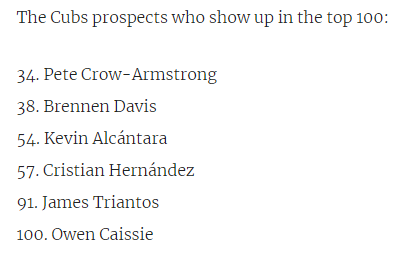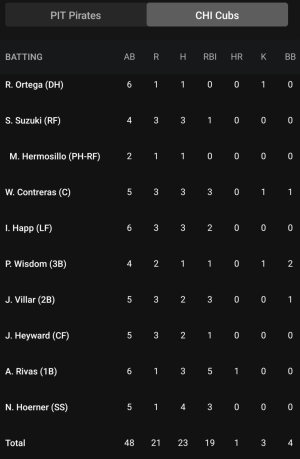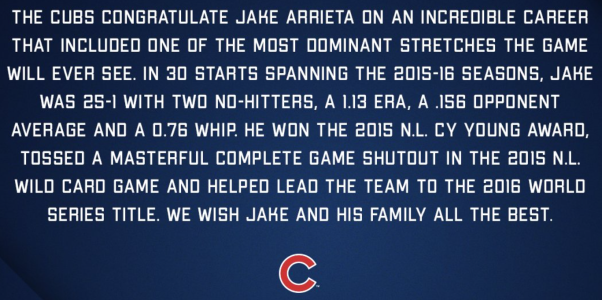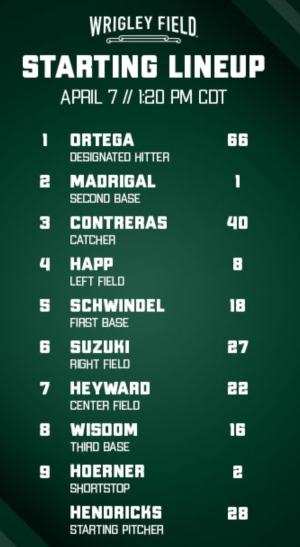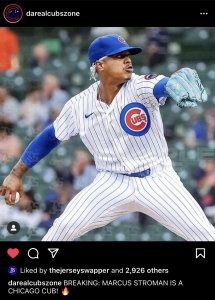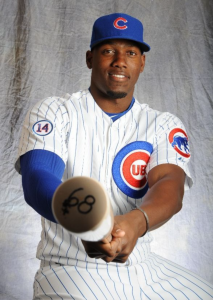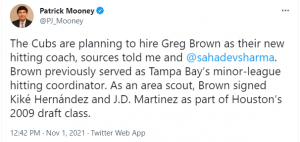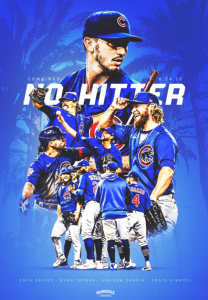CLEVELAND -- At least it didn't take anything special to wipe out the longest title drought in the history of professional sports. Only the greatest World Series Game 7 ever played. That's all.
Move over, Jack Morris and Luis Gonzalez. Tell Ralph Terry and Madison Bumgarner they had a great run. And you, Bill Mazeroski fans, submit your case via your favorite form of social media.
But we would argue that none of those games can top the passion, the drama and the history of Game 7 in Cleveland, on a balmy Wednesday night turned stormy Thursday morning. It took 10 exhausting innings and 4 hours and 45 exhilarating minutes. But when it finally ended, at 12:47 a.m., on Nov. 3, 2016, the giant left-field scoreboard read: Cubs 8, Indians 7. And it was suddenly possible to type a sentence that no living human has ever typed:
The Chicago Cubs are the champions of baseball.
But to scale that mountain they'd been climbing for 108 years, the Cubs found themselves trying to survive a game we'll be dissecting for about a century.
It was just the fifth extra-inning, winner-take-all World Series game ever played.
It was the first of those games, from all accounts, to feature an actual rain delay in extra innings -- a rain delay that may have saved the Cubs' season, by the way.
And it was the first among all those games in which the winning team blew a lead in the eighth inning or later -- but stampeded back to win anyway.
But that's not all. It was a game in which the most unhittable pitchers of this postseason -- first Corey Kluber, then Andrew Miller, then Aroldis Chapman -- turned stunningly hittable.
It was a game featuring the first leadoff home run in World Series Game 7 history (by the Cubs' Dexter Fowler).
It was a game that Chapman couldn't save -- but a man who had never saved a game in his big-league life (Mike Montgomery) could.
And it was a game in which the go-ahead run in extra innings was scored by a man (Albert Almora) who hadn't scored a run in the entire postseason.
It was one crazy ride on the Game 7 roller coaster all right. But here's what it was most of all:
"That," Cubs first baseman Anthony Rizzo said, "was the best game I've ever been a part of -- and the best game I've ever even seen."
For 2½ hours Wednesday night, it looked as though the Cubs might actually do this the easy way. But that would have made no sense. They're the Cubs.
They took a 5-1 lead into the bottom of the fifth inning. And since no team had blown a Game 7 lead that large since 1924, you might have thought that was safe. Ha. Really?
Did you still think that after Jon Lester strolled in from the bullpen for his first relief appearance in nine years and promptly wild-pitched in two runs on the same pitch, cutting that Cubs lead to 5-3?
Did you still think that when Chapman relieved Lester in the bottom of the eighth and did two things he'd never done once in his three months as a Cub: (A) give up hits to the first three hitters he faced and (B) serve up his first home run as a Cub -- a stunning, game-tying, two-out, two-strike rocket off the left-field TV camera that transformed this game from a coronation to a coronary in one shocking wave of Rajai Davis' bat?
It was the latest game-tying Game 7 home run in World Series history. And maybe in some other year, maybe if this were some other Cubs team, it would have turned into One of Those Moments, to be mourned and cursed and passed down from one We'll Never Live to See This generation to the next.
Instead, it turned into a different kind of moment -- the moment this game turned into a classic.
Only the Cubs didn't know that at the time, of course. They were just trying to remember to breathe. And at times like this, that's harder than professional athletes make this look.
"We're normal people," said the World Series MVP, Ben Zobrist, as the clubhouse clock ticked past 2 a.m. "We get nerve-wracked and anxious, just like everybody else."
But as 38,104 people shredded what was left of their vocal cords and an emotional Chapman tried to cope with his guilt over blowing the whole frigging World Series, something amazing happened.
Suddenly, raindrops started pouring out of the Ohio sky. And the umpires were waving for the tarp. Little did anyone know at the time that, as Cubs general manager Jed Hoyer quipped later, "it was like divine intervention."
If ever a team needed to regroup as extra innings loomed, it was the Cubs. And the man who sensed that most was a man who normally speaks as softly as anyone in their clubhouse.
"I was thinking," said Jason Heyward, "that sometimes rain can be a bad thing. But the way we ended that inning, I felt like we needed that rain."
Heyward had about as ugly a year as a $184 million free agent can have. But he carried himself with so much dignity from start to finish that he earned all the respect points that he decided to cash in on this moment. So Heyward gathered his teammates together in a room off the clubhouse and spoke.
"I just wanted to remind these guys of how good they are and how special they are," Heyward said.
"It was a good moment," Lester would say later, holding a champagne bottle in his left hand. "I thought we needed it, after that home run and them coming back and all the momentum on their side. So it was a big moment for us. I thought Jay-Hey spoke up at just the right time."
It would be only 17 minutes later when the game resumed. But when it did, as the Cubs got ready to hit in the top of the 10th inning, "I knew," Heyward said, "we were ready to do what we did."
It was 12:11 a.m. when Kyle Schwarber lined his third hit of the game and his seventh hit of the World Series into right field, and then was replaced by pinch runner Almora. It was 12:15 when Bryant crushed a Brian Shaw fastball that Davis tracked down in front of the center-field wall, and Almora decided it was time to use his wheels, tag up and try to get to second.
"I just said, 'I'm gonna go,'" Almora said later. "And if I get thrown out, so be it."
But once he outraced Davis' throw to the bag, this game would never be the same. The Indians intentionally walked Rizzo to pitch to Zobrist. And as he walked toward home plate, Zobrist reminded himself to inhale and exhale as slowly and deliberately as possible.
"Even when I was falling asleep last night, thinking about this game, I felt like, 'Man, I'm not breathing normal. I've got to relax here,'" he said. "And it's the same thing when you go out on that field. ... I mean, we feel that in the moment, just like everybody else does. You just have to try to block it out and do your job as best you can."
The count ran to 1 and 2. Off in the distance, he could hear the chants of "Let's go, Cubbies" rising above the shrieks of thousands of Indians fans who hadn't sat down for the past three hours. Shaw fidgeted with his cap. Zobrist adjusted his batting gloves and wagged that bat. Shaw reached back and launched the hardest pitch he would throw all night.
And here it came, a 96 mph cutter veering toward the outside corner that Zobrist barely got around on. But he was able to do exactly what he'd been reminding himself to do during this entire at-bat -- stay inside the ball -- and flick it just beyond the reach of Cleveland third baseman Jose Ramirez.
This franchise-altering scene unfolded right in front of Almora. So the moment the baseball left Zobrist's bat, he said, "I knew I was going to score, no matter what." And as Zobrist chugged toward second, fist pumping, and Rizzo pulled into third mouthing the words "Oh my God," a man who hadn't scored a run in a month was sliding through the dust of the batter's box, then popping up to take care of one piece of unfinished business.
"The first thing that went through my mind," Almora would say later, shaking his head, "was go back and tag home plate. I mean, the last thing you want to do is have people going back through history and being remembered as That Guy [who missed the plate with the winning run]. So I went back and tagged home plate. And then I started celebrating."
All around him, a tale of two fan bases erupted in the seats, where thousands of title-starved Cubs fans were interspersed with a house otherwise packed with Indians fans. What an incredible scene. Cubs fans in blue shirts hugging. Indians fans in red shirts recoiling in shock. And the Cubs' dugout rippling with energy.
But this inning wasn't over. The Indians intentionally walked Addison Russell to pitch to the Cubs' third catcher of the night, Miguel Montero, with the bases full. It was another pivotal moment. It had been nearly three weeks since Montero's last (and only) hit of this postseason. But he slapped an RBI single through the left side to open the Cubs' lead to 8-6.
"As I was running down to first," Montero said, "I was, like, 'I got him.' And that was important to me. I was like, 'Don't load the bases to face me, man.'"
So there were the Cubs, two runs up and three outs away -- but with Chapman exhausted and no obvious option to close out the game. These last three outs still held the potential for major agony.
At 12:33 a.m., out of the pen came rookie right-hander Carl Edwards to get them to within one out. But these are the Cubs, friends. Did you think this could possibly go 1-2-3? Edwards walked Brandon Guyer. Davis roped an RBI single. It was 8-7. And here came Joe Maddon one last time -- at 12:44 a.m. -- to summon his unlikely World Series closer, Montgomery.
"You know what's funny?" Montgomery admitted later. "When I came in, I honestly didn't realize it was a save situation. All I kept telling myself was, 'I've just got to get one out.'"
At the plate stood the last man on Terry Francona's bench, utility man Michael Martinez, a guy whose last hit had come more than seven weeks ago. Montgomery snapped off a curveball for strike one. He turned and smoothed the dirt on the mound with his spikes, then leaned in for the sign.
He spun off one final curveball, the Cubs' 172nd pitch of the night. Martinez thunked it softly toward third base. Montgomery looked up, saw Bryant waiting to gobble it up and tried to process a thought shared by every Cubs fan in the universe: "I couldn't believe it. I thought to myself, 'It's over!' And at that point, it was just kind of madness."
Yeah, that's one word for it, anyway. Madness. Mayhem. Ecstasy. Heaven. Pick whatever description works. The Chicago Cubs had won the World Series, and won it the only way they could.
The hard way.
"I'm exhausted," catcher David Ross said. "I feel like we just played for nine hours."
But what's another nine hours when a team has waited 39,465 days to win the World Series? All it took was a century of waiting, a remarkable climb out of a three-games-to-one hole and the greatest Game 7 ever played. But finally, at 12:47 a.m., Cubbie Daylight Time, the wait was over.
"You know what?" said the World Series MVP. "I think we just s--t-canned those curses."
Navigation
Install the app
How to install the app on iOS
Follow along with the video below to see how to install our site as a web app on your home screen.
Note: This feature may not be available in some browsers.
More options
You are using an out of date browser. It may not display this or other websites correctly.
You should upgrade or use an alternative browser.
You should upgrade or use an alternative browser.
Official 2023 Chicago Cubs Season Thread Vol: (17-17)
- Thread in 'Sports & Training' Thread starter Started by CP1708,
- Start date
There are many who have waited their entire life for this moment. They are octogenarians and children, grandparents and great-grandparents and teenagers. For more than a century, the Chicago Cubs were the punchline to an eye-roll-inducing joke. They were haunted by the specters of goats and a man in headphones. The Cubs have seen the fall of the Ottoman Empire, two world wars and a cold one, the advent of television, the atomic bomb, the nuclear family, two passes of Halley’s Comet, and the turning of the century. It has been a long time coming for the North Side of Chicago. And now, the moment has arrived.
For the first time in 108 years, the Cubs won the World Series. The longest championship drought in all of sports was emphatically vanquished once and for all. Chicago came back from a 3-1 deficit to win three games in a row and claim the title, pulling one last rabbit out of their hats and stunning the Cleveland Indians in extra innings.
It was a game that was chaotic enough to exorcise any demons. Fifteen runs scored, one of them on just the fourth pitch of the game when Dexter Fowler sent a ball over the center-field wall for a leadoff home run. Another was on a Javier Baez home run that came after he made two critical fielding errors, and another still when David Ross, 39 years young, took Andrew Miller deep. Just the inning before, two Cleveland runs had scored on a wild pitch that bounced hard off his mask. There were 24 hits, four errors, and one brief extra-inning rain delay.
This was a game that ran roughshod over our emotions and nerves. It drew life from exasperated groans and gasps. For every excellent Kris Bryant slide, there was Joe Maddon inexplicably bringing in Jon Lester with a man on first base, while Kyle Hendricks‘ only struggles were the product of a nebulous strike zone. Terry Francona, who had been so incredibly good this postseason, left his starter in for one batter too long, and the Cubs finally solved the mystery of Corey Kluber.
With two outs in the eighth inning, Maddon turned to his closer. Aroldis Chapman had pitched multiple innings with a large lead the previous night, and had a long outing during the final game at Wrigley Field, as well. His fatigue was immediately apparent. When he surrendered a game-tying home run to Rajai Davis, it looked like Maddon’s luck had finally run out. All series long, Maddon had acted either with conservatism or with the reactionary recoiling of a child in need of a security blanket. He had pushed Chapman to his limit in a game that was over and done with by the sixth inning, and nearly paid for it on Wednesday night with the season on the line. When he sent Chapman back out for the ninth inning, it was an act of even greater madness.
Somehow, Chapman finessed his way through the inning with a heavy reliance on his slider and a fastball that didn’t once show off his trademark triple-digit velocity. Then came the rains, and a Jason Heyward rallying speech that will surely become the stuff of legend. The Cubs rallied for two runs in the tenth. Ben Zobrist, the eventual series MVP, knocked in the go-ahead run. Maddon used a combination of Carl Edwards Jr. and Mike Montgomery to seal the deal.
Hell has frozen over. The Cubs broke the curse. It’s an event about which many have fantasized, but which also never seemed quite possible. No matter how good the Cubs have been, there has always been something in their way. Ernie Banks didn’t win a championship, nor did Ron Santo. Andre Dawson won his MVP award with Chicago, but not a ring. Ryne Sandberg, Sammy Sosa and Fergie Jenkins all came and went without bringing this team a World Series win.
Bryant brought the title. Anthony Rizzo did. Kyle Schwarber, who somehow came back from a catastrophic knee injury to DH in the World Series, did. The names of the players on this team will go down in history forever, as will the names of Theo Epstein and Jed Hoyer. They are forever enshrined in baseball lore, Bryant alongside the likes of Mickey Mantle; Epstein alongside Connie Mack and Branch Rickey. This may very well go down as the most iconic game in this sport’s history.
The Cubs won, rather fittingly, with Montgomery on the mound. Montgomery was the other pitcher acquired at the trade deadline. He doesn’t throw 100 mph, nor was he acquired in exchange for an excellent two-way shortstop prospect. He was acquired for a husky young DH. Montgomery was once a top pitching prospect before he faltered at the highest levels. This was his second season in the big leagues. He came in to face one batter, Michael Martinez, who first came up at age 28 in 2011. Martinez has only appeared in 267 regular games since then. He’s the 25th man of every roster to which he’s belonged.
Here were two unlikely men, playing in an unlikely spot, in the most unlikely of games. With one swing of his bat, Martinez could have won the World Series. He has only hit the ball over the fence six times since coming up. Instead, Montgomery got him to ground out to Bryant at third base, and that was that. Martinez is now the answer to a trivia question, as is Montgomery.
The Cubs didn’t win the World Series with their high-profile trade acquisition on the mound. Perhaps this was a blessing in disguise. The annals of history will not show Chapman, who was suspended under the league’s domestic-violence policy at the start of the season, celebrating recording the final out. They will show Montgomery getting Martinez to ground out. Chapman got the win in the game, but only because he had yet to be officially replaced when the Cubs took the lead. He got the win, but the Cubs won in spite of him.
Montgomery is the perfect man for history to watch over and over again. He is the answer to a trivia question, as are Bryant, Sandberg, Sosa, Banks, Santo, Dawson and Jenkins.
History was made on Wednesday night, the kind of history that ripples across the sports world and the very fabric of baseball. The curse is no more. The Cubs are World Series champions, and no, you’re not dreaming.
The Chicago Cubs just won the World Series, their first in 108 years. The way this team is constructed, though, they might not have to wait long for another one.
A few facts about this team, and why they’re going to be tough to take down over the next few years.
View media item 2219217
It’s no secret that the Cubs have some of the best young hitters in baseball, but it is exceptionally rare for teams with this many young hitters to win it all. The last World Series winner with to give at least 2,400 plate appearances to players in the 25 and under category was the 1971 Pirates; unsurprisingly, the Pirates won 57% of their games in the 1970s, finishing first or second in their division in seven of the next eight years.
But even that Pirates team wasn’t really this Cubs team. The star players on that team were 31 year old Willie Stargell and 36 year old Roberto Clemente. The ’71 Pirates had some really good young position players, but as a group, they got +17.1 WAR from their young hitters; the 2016 Cubs got +18.4 WAR from their young hitters, despite using 400 fewer plate appearances.
To put that +18.4 WAR from 25 and under hitters into comparison, let’s look at the last 70 years of baseball, which takes us back to 1947, avoiding the years World War 2 messed with the game’s demographics. During that span, only seven teams have gotten more production from their young hitters than this year’s Cubs team.
But even that undersells how good this group is. 25 and under is an arbitrary bucket I just used because that’s how the Play Index splits their age groups, but the Cubs actually didn’t have any 25 year old hitters this year, so using that bin compares them to other teams with older hitters included. Using our leaderboards, you can dial in more specific age brackets, and if you go 24 and under, you’ll see the Cubs still have +18.4 WAR, you’ll see only three teams have gotten more production from that group in the last 70 years than this Cubs team.
This is an historically great group of young hitters. Having some great young hitters doesn’t guarantee anything — for instance, the 1978 Expos rank atop the young hitter WAR leaderboard, and then had a two year run of 90 win teams that didn’t reach the World Series, before fading — but it’s the best place to start building a franchise. The 2015 Mets were exciting because of their young arms, but as 2016 showed, arms break, sometimes all at the same time.
As the table above shows, this Cubs team was extraordinarily reliant on young hitting, but not at all reliant on young pitching. And while the age of the pitching staff is the likely weak spot in any dynasty talk, the fact that this team doesn’t have a lot of expected value tied up in the most fragile asset you can have speaks to the solid base they have in place. The Cubs middle-aged and older pitchers aren’t going to keep pitching this well forever, but there’s a lot less risk in this kind of pitching staff than in one that is heavy on young arms.
And while Kris Bryant and Anthony Rizzo are obviously the cornerstones, it’s the depth of young positional talent that really makes the Cubs scary. With any group of players, you’re going to have some guys who go the wrong direction, or never develop as expected, but there are just so many reinforcements here. The team only got a half season out of Willson Contreras this year, and he’ll almost certainly play a bigger role on the 2017 Cubs team. Kyle Schwarber missed the whole season, essentially. Javier Baez was still a part-time player. Jorge Soler is still around and still talented. Albert Almora is around as an interesting outfield option for the future, especially if he ever learns how to take a pitch.
It’s not just Bryzzo and Russell, and because of that depth, the Cubs should be able to field high-quality athletic line-ups capable of sustaining something like this level of performance for a while. We can’t hand wave away the contributions of older players like Dexter Fowler and Ben Zobrist, but by and large, there isn’t much reason to expect the Cubs offense or defense to take a big step back any time soon.
The pitching staff is where the questions lie. John Lackey isn’t going to be this good for much longer. Jon Lester is aging. Jake Arrieta is a year away from free agency, and based on his reported asking price, is probably only going to spend one more year with the Cubs. The bullpen, as we just saw, has some question marks surrounding the health of their best regular season arms, and the group looks a lot weaker if Pedro Strop and Hector Rondon aren’t 100% next year.
But the Cubs are a high-revenue franchise that just set themselves up for a significant windfall, thanks to the revenue boost that comes from winning a World Series. This is a team that can afford to spend money on free agent pitching to supplement their young core. It’s the kind of team that can afford to take on contracts if need be, because the cheap young hitters give them plenty of budget room to add quality veterans at market prices.
This roster is something close to the ideal way you’d want to build a team for the long-term, and we may not have even seen the Cubs at their best yet. They won 103 games and the World Series, but there’s enough guys on this team that can still get better that this might just be the start of the run, not the very top of the mountain.
Of course, baseball can happen. The Cubs should be thrilled they got one when they had a chance, because they might not get another one. Baseball can be fickle. But looking at how this Cubs team is structured, there’s a real chance that this was just year one of the kind of dynasty we haven’t seen in baseball since the Yankees owned baseball at the end of the 1990s.
Trey Bantz
formerly trey ohh five
- Sep 4, 2009
- 19,602
- 10,574
I see the Cubs becoming the Red Sox. We were happy for them when they broke the curse, then started hating them when they became perennial winners 

I see the Cubs becoming the Red Sox. We were happy for them when they broke the curse, then started hating them when they became perennial winners
Warriors too, but yes, I agree. Happy go lucky vibe right now, 2-3 years from now, we will be loathed by other fanbases.

Trey Bantz
formerly trey ohh five
- Sep 4, 2009
- 19,602
- 10,574
I see the Cubs becoming the Red Sox. We were happy for them when they broke the curse, then started hating them when they became perennial winners
Warriors too, but yes, I agree. Happy go lucky vibe right now, 2-3 years from now, we will be loathed by other fanbases.
You're also a Canes and Lakers fan, so you know how good it feels to be hated for being great

shatterkneesinc
Banned
- Nov 25, 2005
- 22,524
- 2,383
I see the Cubs becoming the Red Sox. We were happy for them when they broke the curse, then started hating them when they became perennial winners
My mets will take care of them next year
Lake Shore Drive
formerly slp product
- Feb 8, 2005
- 7,336
- 2,445
This hangover is too real....
Still can't believe we did it bros!!!
Surreal.
Still can't believe we did it bros!!!
Surreal.
Bob Nightengale @BNightengale Nov 1
Kris Bryant and Anthony Rizzo became the first 3-4 hitters to record 7 or more hits in a game in World Series history. #Cubs
CLEVELAND -- Every year along Lake Michigan, they shut down the famous Buckingham Fountain in Grant Park. The water is shut off, leaving behind an empty cement hole with some lonely looking seahorse sculptures sticking up, and the ornate terraces of the fountain itself that look so dazzling under the summer sun. People still shuffle along the pebble-coated plaza surrounding the fountain during the winter, taking selfies and otherwise admiring the thing they can really see better in their mind's eye. Then in the spring, somebody turns the water back on and the show begins all over again.
And so it is for Wrigley Field. The Ivy is turning into yellow, dried vines, the bars along Clark Street will go back to demanding normal cover charges, and the work on the new hotels across the street will resume. The Chicago Cubs' season is over, and what a season it was, the biggest in 108 years. All those who wondered what a World Series would look like at Wrigley Field have seen it. The ultimate, city-rocking celebration is underway, there will be a parade downtown past the hibernating fountain, and then we move on and Ferris Bueller will go back to school.
That the Cubs achieved their ultimate goal is bittersweet for players and fans alike. The World Series drought was huge, reminding one of Pop Fisher's line from "The Natural" -- "Red, I wanted to win that pennant worse than I wanted any damned thing in my life. You'd think I could just this once, wouldn't you? I didn't care nothing about the Series. Win or lose, I would have been satisfied. I'd have walked away from baseball, and I'd have bought a farm."
It's safe to say no one in Chicago is likely to give up baseball and enter the agricultural field, but there is one thing that they now realize. As sweet as winning that long-sought-after pennant was, winning the World Series was even better. But there is work left to do. Getting to the top is one thing, staying there is another. And while the Cubs head into winter trying to figure out what the finishing touches might be, the greater baseball community can rejoice: Next year, we get to do it all again.
That the Cubs attracted interest in baseball well beyond their home city is undeniable. According to Major League Baseball, Game 2 of Chicago's National League Division Series against the San Francisco Giants was the highest-rated game in MLB Network history. Game 6 of the National League Championship Series against the Los Angeles Dodgers was the highest-rated LCS game in six years. According to the New York Times, the World Series was drawing the most viewers since the Boston Red Sox beat the St. Louis Cardinals in 2004, and Sunday's Game 5 drew about 5 million more viewers than Sunday Night Football.
Needless to say, the ratings for Game 7 are expected to be off the charts. After years of decline in World Series viewership, this year's Series was watched at levels not seen in more than a decade. On the internet, for months Cubs-related content could not be churned out fast enough to satisfy demand. The World Series attracted a media contingent similar in size and demeanor to a "Game of Thrones" battle scene.
People are watching, so now what? "Final step" narratives are always attractive, but now that step has been taken. There is no real reason to think next season is going to be any different in interest or enthusiasm, but perhaps Cubs fatigue sets in. The Cubs' World Series drought is over. The goat is laid to rest, and the team is young and marketable. According to their manager, it's only getting better.
"If you really take a moment to look out there, like that last game and even this game," Joe Maddon said before Game 3, "there's a lot of young, inexperienced players. Beyond today, beyond these next couple days that makes me think just check these guys out in a couple years. The biggest difference, I think, is that they're going to become better hitters, better offensive players.
"Their defense will stay the same. Their running speed will stay the same. Their arms, as long as they have good health, will stay the same. The area you're going to see this team even get better is offense."
In other words, Cubs mania almost certainly didn't peak in 2016. They might not yet even see the peak at all. That's good for baseball, both in terms of economics and drawing new fans to the game in general. Sure, there will be fatigue in other major league cities, and St. Louis might construct some kind of wall along the Mississippi to keep Cubs fans out. But for all those like Bryce Harper who have winged about the need for more fun in baseball, here it is. The Cubs have become the face of the big leagues.
To stay that way, they will have to remain elite on the field. That's not likely to be a problem, though every year is precious. For no better example, the Cubs only need to look around the city they just finished playing in, where the mid-1990s Cleveland teams looked like a sure thing. While the Indians had a nice run of success that included a couple of pennants, the World Series title drought they failed to snap Wednesday remained.
All trends for the Cubs are pointed in the right direction. President of baseball operations Theo Epstein just signed a five-year extension. General manager Jed Hoyer is sticking around and assistant GM Jason McLeod, after being mentioned for the Minnesota job, is apparently remaining with the Cubs as well. The braintrust's new task: To solve the randomness of the postseason, something that Epstein himself has declared can never be done.
This winter, the Cubs have precious few holes to fill. This was a complete team, ranking third in run scoring, first in ERA and first in defensive efficiency. The position players as a group were the fifth youngest in all of baseball. If you consider 27 to be the most likely age for a hitter's best season, Anthony Rizzo and Jason Heyward hit that next year, while Kris Bryant, Addison Russell, Javier Baez, Jorge Soler, Willson Contreras, Albert Almora Jr. and Kyle Schwarber all still have several years before they get there.
"There are a lot of ancillary benefits to be derived right now," Maddon said of this postseason run and the organization's ability to hold it all together. "And our guys are young. I'm really proud of how they've dealt with this moment. But looking down the road, I want to believe with their ability to do other things, to be able to keep this core group together, and then augment it, I think could be pretty special."
The offense was exposed for much of the season by elite pitching, and that was especially true in the playoffs. But the Cubs have plenty of time to make progress in that area given the ages of their position players and seemed to do so within the confines of the postseason itself. Plus, they can hope the offseason helps Heyward reset and regress to his career norms, even as he might well be accepting a 2016 Gold Glove for his work in the outfield. And they'll have Schwarber, who played only one full game during the 2016 regular season.
The big question marks are in the outfield. Dexter Fowler holds a mutual option. From his standpoint, it's a question of whether he wants to relive his long, uncertain winter of last offseason; from the team's perspective, it's a matter of whether they think Almora is ready to take over in center. Also, with Schwarber coming back, the outfield depth chart could begin to look a little crowded, so maybe you dangle someone for pitching.
But who? The top four of the starting rotation appear to be ironclad with Jon Lester, Jake Arrieta, Kyle Hendricks and John Lackey. Jason Hammel has a reasonable club option for 2017, and you aren't going to find many better options for a No. 5 starter. Unless it's Mike Montgomery, the big lefty who did so much good work out of the bullpen during the playoffs.
The target area probably will be the bullpen. The Cubs have to decide how much they are willing to invest in Aroldis Chapman. And if not him, then who? There are a lot of nice pieces, such as Carl Edwards, Hector Rondon, Pedro Strop and Justin Grimm, but without a closer of Chapman's status, it begins to look thin, as it did before this year's deadline. Even if they keep Chapman, the Cubs have seen first-hand what an overpowering bullpen can do in the postseason, and they have to ask whether they have the arms to create that for themselves.
In a baseball context, these are first-world problems. The Cubs could stand completely pat and enter the 2017 season as heavy favorites to repeat in the NL Central. They have the game's most dynamic front office and a field manager at the forefront of his profession. They have all the resources they need and a farm system that remains loaded.
If you are tired of the Cubs, then we feel for you. This is a story in medias res and the climax looms in the distance. Though the Cubs have reached their destination, they might just set up shop there for a while. After all the buzz we've witnessed over the past few months, it's hard to think that's anything but a win-win for the baseball industry. As for their competitors, it's up to them to figure how, or if, they can again banish the Cubs to the realm of the lovable losers.
4. Chicago Cubs
2015 rank: 1
Players in top 100 (2016): 6
They graduated Kris Bryant, Kyle Schwarber and Addison Russell but are still loaded with talent, albeit most of it unlikely to help before 2017. The system has long been light on arms, but there's some pitching coming if you squint hard enough into the distance.
Lake Shore Drive
formerly slp product
- Feb 8, 2005
- 7,336
- 2,445
Dexter Fowler is declining his option for this year, making him a free agent. We'll see if Theo tries to bring him back again, or if he lets him walk for good. If he leaves, we will receive a draft pick for it.
Yeah, Jesse Rogers was talking about this on ESPN radio yesterday.
Definitely would love to keep Dex but he earned himself a nice payday......wish we could throw some of Heyward's money at him

I expect Chap to be gone as well.
Lake Shore Drive
formerly slp product
- Feb 8, 2005
- 7,336
- 2,445
Wow!!!
Miggy just had one of the most awkward, salty, and weird interviews on the waddle and silly show.
Bad way to end the parade day. Sour grapes.
Miggy just had one of the most awkward, salty, and weird interviews on the waddle and silly show.

Bad way to end the parade day. Sour grapes.
CVO_RN95
formerly shoegamer19
- Oct 15, 2014
- 1,998
- 549
Wow!!!
Miggy just had one of the most awkward, salty, and weird interviews on the waddle and silly show.
Bad way to end the parade day. Sour grapes.
What happened?!
arstyle27
Supporter
- Nov 13, 2001
- 10,628
- 3,614
What happened?!
Miggy said he loved winning the World Series but didn't really feel like he was a part of because of his limited playing time. He also felt that Joe should've communicated better him in regards to his playing time, more specifically about not catching. Also said Sczur should've made WS squad not Coghlin.
DeadsetAce
Supporter
- May 31, 2004
- 107,855
- 54,049
What happened?!
Miggy said he loved winning the World Series but didn't really feel like he was a part of because of his limited playing time. He also felt that Joe should've communicated better him in regards to his playing time, more specifically about not catching. Also said Sczur should've made WS squad not Coghlin.
whoa. odd
- Mar 2, 2011
- 30,498
- 5,958
Wow.. what a damn series.
Game 7 was a classic.
Big ups to the Cubs man.
CP you already know bro
Game 7 was a classic.
Big ups to the Cubs man.
CP you already know bro

- Dec 23, 2003
- 761
- 534
Been to like 6 different Richards and have given up looking for the Fitted with the World Series Champions patch. And on any other hat besides the locker room hat. Gonna order online.
Last edited:
- Sep 7, 2005
- 9,070
- 5,705
Still can't believe it
- Jun 26, 2009
- 9,064
- 1,157
Still can't believe it
Neither can I. I've been watching game 7 highlights everyday





